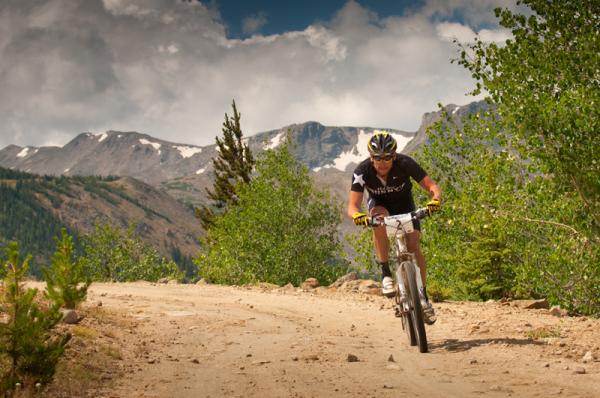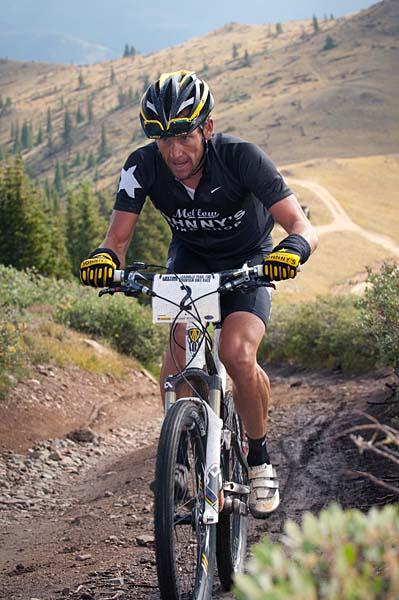Race Across the Sky movie not just about Lance Armstrong
Human drama of Leadville 100 eclipses its stars


Plenty of cycling documentaries have managed to show the power of the human spirit - the force that drives us to push our bodies beyond what our limited imaginations may think is possible - but few have done so more effectively than the beautifully shot film "Race Across the Sky".
Unlike documentaries on professional races like Paris-Roubaix or the Tour de France, which focus only on the superhuman feats of the world's elite cyclists, "Race Across The Sky" shows the real struggles of everyday riders alongside the heroic feats of Lance Armstrong and six-time Leadville winner David Wiens against the elements, the terrain, altitude and themselves as they attempt to finish the 100-mile mountain bike race.
The film made its debut on October 22, 2009 with a limited showing in theaters in the US, attracting some 45,000 viewers nation-wide across 500 venues, enough to justify a second showing on November 12.
The producers at Citizen Pictures have a passion for cycling, and it shows. Executive producer Frank Matson has raced the Leadville Trail 100 three times, while producer Dustin Astrom was Matson's mechanic before switching careers. Their deep connection with the race helped them to bring out the unique nature of the event.
While Armstrong's presence in the film is compelling, and the viewer gets a glimpse of his human side when he suffers an untimely flat tire in the final leg, the best developed characters of the film are, rather appropriately, the organiser Ken Chlouber and Wiens.
The theater release of the film was book-ended by a panel discussion led by cycling announcer Dave Towle with Chlouber, Armstrong, Wiens, Travis Brown and Matt Shriver - two of the other key players in the race. For a cycling journalist, this felt a little bit too much like work, but a cycling fan might be more interested in the interviews.
According to producer Astrom, the panel discussion will be programmed as a special feature on the DVD release so viewers can enjoy the meat of the film without delay.
Get The Leadout Newsletter
The latest race content, interviews, features, reviews and expert buying guides, direct to your inbox!
When the body of the film finally opens, the viewer at last gets a glimpse of the (quite literally) breathtaking landscapes that Leadville has to offer.
100 miles on a mountain bike is a challenge for most people in and of itself, but at 10,000 feet above sea level, the Leadville Trail 100 tests even the top riders, who must pace themselves well enough to be able to finish, let alone win.
For the regular folks, the race becomes a challenge, as Armstrong points out, along the lines of a New York City marathon or Iron Man. Each person has their own reasons for wanting to take on such a challenge, and the individual stories are what make this documentary moving.
Just the nature of the old mining town - its surrounding countryside with soaring peaks and vast, open expanses - is enough to stir emotion. As Chlouber briefly points out, Leadville struggled to overcome its own adversity in the wake of the mine's closing in 1983, when more than half of the 5,000 residents suddenly became unemployed.
Chlouber, himself a former miner, personifies the gritty determination that keeps a town going after such a trauma, and he embraces it as his personal mission. Leadville, Chlouber, and all of the participants in the many endurance races that take place in the town, come to live by his catch-phrase, "You're better than you think you are, and you can do more than you think you can".
Chlouber's devious course gives riders plenty of opportunity to test their limits and, as he says, emerge "refined, regenerated as a better you - a you without limits, a you that has been stripped to raw nerve and will never quit".
Coming from anyone but the down-home Chlouber with his thick drawl, the inspirational speech to the riders at the pre-race meeting might be cheesy, but after a quick preview of the course, narrated by Bob Roll, it becomes clear that this is the type of event which lends itself lofty speeches.
Yet therein lies the one flaw I found with the film, something which will hold this movie back from mainstream appreciation. While US cycling fans may have become accustomed to Roll's often flowery, sometimes bizarre stream-of-consciousness ramblings, most will find his narrative style to be less than fluid.
With an all-Colorado production team, it makes sense that Roll, a Durango resident, would be a part of the documentary, but it may have been better for him to give his comments in an interview rather than take the authoritative role of narrator.
As viewers are treated to spectacular helicopter shots of Armstrong soloing toward the turnaround at the top of the Columbine climb, where he appears to be riding along the edge of the world, Roll's narrative almost spoils the scene by being so over the top I think it may have landed somewhere in New Mexico.
While Armstrong will undoubtedly be the name which draws people to watch the film, the best and most compelling parts of the movie are the vignettes about the 1,400 other riders, most of whom came with the goal of merely finishing the race - people like Roxanne Hall, who was hit by a car and critically injured, then fought back to health in time to race.
This, a few other touching stories, children hugging and cheering on their parents, and grown men reduced to tears when they are eliminated by the time cut will tug at the heart strings of all but the most hardened viewers.
It all demonstrates how seriously the participants take the race, but at the same time everyone, even Armstrong himself, takes time to give encouragement to his competitors along the way thanks to the race's unique out-and-back format.
And that is what puts this film outside the norm for bicycle racing films: it gets to the core of why bicycle racing even exists - because we all strive to test our limits and become better human beings, but we do it best in a supportive community. It's a refreshing reminder for those of us who are so steeped in the dog-eat-dog world of pro cycling.
The film delivers its message with great passion, and was an enjoyable experience, one that, when it comes out on DVD in February or March, will provide good inspiration to "harden the f___ up". That's something we can all use on occasion.

Laura Weislo has been with Cyclingnews since 2006 after making a switch from a career in science. As Managing Editor, she coordinates coverage for North American events and global news. As former elite-level road racer who dabbled in cyclo-cross and track, Laura has a passion for all three disciplines. When not working she likes to go camping and explore lesser traveled roads, paths and gravel tracks. Laura specialises in covering doping, anti-doping, UCI governance and performing data analysis.